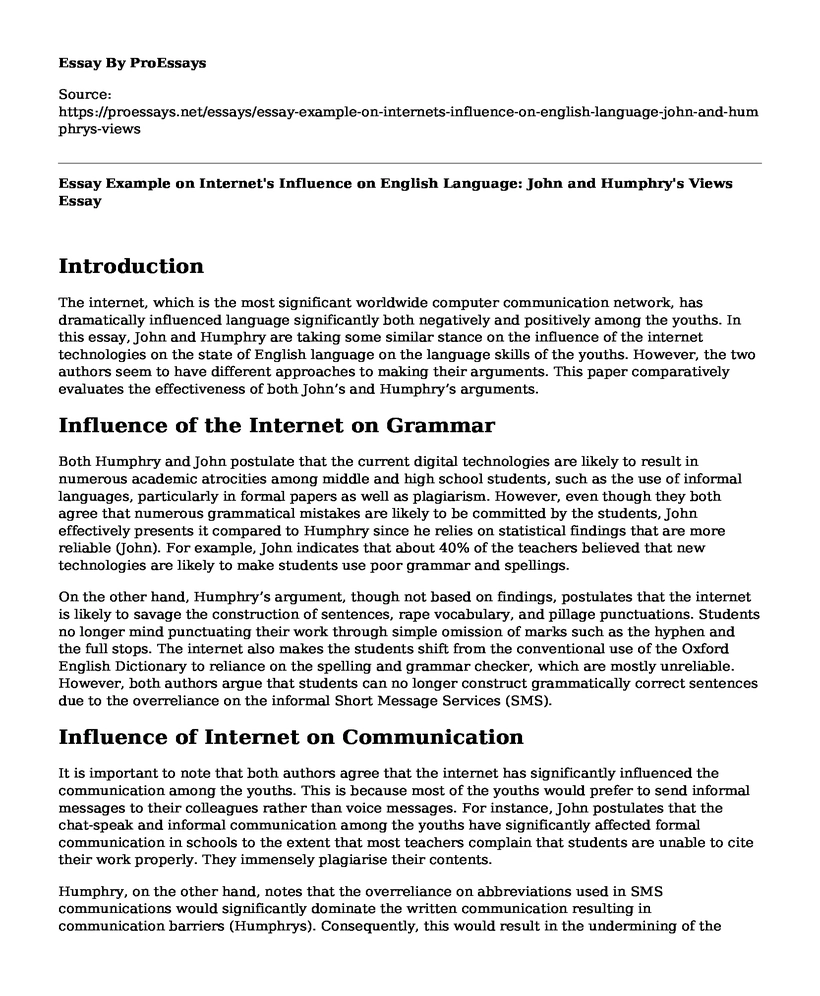Introduction
The internet, which is the most significant worldwide computer communication network, has dramatically influenced language significantly both negatively and positively among the youths. In this essay, John and Humphry are taking some similar stance on the influence of the internet technologies on the state of English language on the language skills of the youths. However, the two authors seem to have different approaches to making their arguments. This paper comparatively evaluates the effectiveness of both John’s and Humphry’s arguments.
Influence of the Internet on Grammar
Both Humphry and John postulate that the current digital technologies are likely to result in numerous academic atrocities among middle and high school students, such as the use of informal languages, particularly in formal papers as well as plagiarism. However, even though they both agree that numerous grammatical mistakes are likely to be committed by the students, John effectively presents it compared to Humphry since he relies on statistical findings that are more reliable (John). For example, John indicates that about 40% of the teachers believed that new technologies are likely to make students use poor grammar and spellings.
On the other hand, Humphry’s argument, though not based on findings, postulates that the internet is likely to savage the construction of sentences, rape vocabulary, and pillage punctuations. Students no longer mind punctuating their work through simple omission of marks such as the hyphen and the full stops. The internet also makes the students shift from the conventional use of the Oxford English Dictionary to reliance on the spelling and grammar checker, which are mostly unreliable. However, both authors argue that students can no longer construct grammatically correct sentences due to the overreliance on the informal Short Message Services (SMS).
Influence of Internet on Communication
It is important to note that both authors agree that the internet has significantly influenced the communication among the youths. This is because most of the youths would prefer to send informal messages to their colleagues rather than voice messages. For instance, John postulates that the chat-speak and informal communication among the youths have significantly affected formal communication in schools to the extent that most teachers complain that students are unable to cite their work properly. They immensely plagiarise their contents.
Humphry, on the other hand, notes that the overreliance on abbreviations used in SMS communications would significantly dominate the written communication resulting in communication barriers (Humphrys). Consequently, this would result in the undermining of the English Language. It is essential to note that even though the Humphry argues that the internet entirely affects communication negatively, John presents a rational argument by stating both the negative and positive perspective. For instance, he argues that despite the negative effects of causing language atrocities, digital tools and the internet have made teaching easier. According to John, most teachers feel that most students are becoming active as thinking, synthesis, and editing through the use of the internet and other digital tools.
Influence of Internet on Language Integrity
It is essential to note that both authors argue that the internet significantly influences the English language's integrity. However, their take on integrity is somewhat different. For instance, John argues that the internet is causing academic offenses such as plagiarism that results from copy-pasting of contents. Students also find it hard to read long texts and form complex arguments. Through the internet, the students can now collaborate through copy-pasting of contents from Wikipedia without including citations. Some of the students’ compromise academic integrity through copy-pasting of any information found online.
Similarly, Humphry presents a more effective argument since he adopts the personal reflection point of view while presenting the internet's influence on academic integrity (Humphrys). John indicates that about 40% of the teachers believed that new technologies are likely to make students use poor grammar and spellings. Most teachers, according to John, feel that most students are becoming active as thinking, synthesis as well as editing through the use of the internet and other digital tools.
Conclusion
In conclusion, it is essential to note that both John and Humphry have varying approaches to the influence of the internet on English language and skills in terms of language integrity, communication, and grammar. Despite the diverse viewpoints, it is essential to note concisely that John is more effective than Humphry in presenting the influence of the internet on the English language among the youths. He uses more statistical evidence as well as a rational argument to present his viewpoints. According to him, the internet poses both positive and negative influence on language among the youths. The internet also makes the students shift from the conventional use of the Oxford English Dictionary to reliance on the spelling and grammar checker, which are mostly unreliable. For instance, according to John, feel that most students are becoming active as thinking, synthesis as well as editing through the use of the internet and other digital tools.
Works Cited
Humphrys, John. "I h8 txt msgs: How texting is wrecking our language." Daily Mail 24.09 (2007): 2007. http://blog.canacad.ac.jp/wpmu/kiaora/files/2015/05/I_h8_txt_msgs.pdf
John, Arit. "The Internet Is Making Writing Worse." The Atlantic, 2020, https://www.theatlantic.com/national/archive/2013/07/internet-making-writing-worse/313199/. Accessed 17 June 2020.
Cite this page
Essay Example on Internet's Influence on English Language: John and Humphry's Views. (2023, Sep 04). Retrieved from https://proessays.net/essays/essay-example-on-internets-influence-on-english-language-john-and-humphrys-views
If you are the original author of this essay and no longer wish to have it published on the ProEssays website, please click below to request its removal:
- Mesh Network Implementation
- Essay on Impact of Social Media on College Students
- Privacy Risk With Social Media Essay
- Online Learning as a More Effective Tool in Distance Learning Essay Example
- Essay Sample on Graphic Designers and Digital Media
- Essay on 7 Dimensions of Wellness for Mental Health & Child Development
- Chocolate Chip Cookies: Essay Sample on College Business Opportunity







